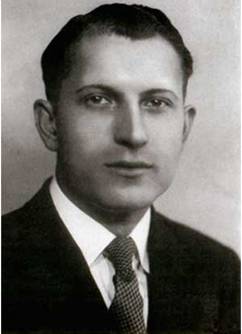Díky.
5 April 1914 Sergeant Arnošt Hrad was born
Categories: Personalities , Second World War , Calendar
 He rejected the Munich Agreement and did not want to leave the fortress at the Polish border. Arnost Hrad committed suicide at the age of twenty-four, before writing three suicide notes. He was born on April 5, 1914.
He rejected the Munich Agreement and did not want to leave the fortress at the Polish border. Arnost Hrad committed suicide at the age of twenty-four, before writing three suicide notes. He was born on April 5, 1914.
Sergeant Arnošt Hrad was a member of the IV. Battalion of Frontier Regiment 6, which during the September 1938 mobilization was assigned to the infantry sub-unit of infantry cabin K-S 14 "U cihelny". After the signing of the Munich Agreement, he did not accept the order to leave the fortifications. When the building was being cleared in early October 1938, he shot himself in the heart. He was immediately taken to the hospital in Červená Voda. He died that evening.
"His memorial plaque is located in the entrance of the reconstructed infantry cabin K-S 14. Inside, the exhibition presents the history of the legions, the founding of Czechoslovakia, the beginnings of war surgery, the Financial Guard with a commemoration of the fallen, Sergeant Arnošt Hrad and Josef Mašín. An obstacle system has been restored in the surroundings. The tour is guided and you can also visit the nearby light fortification object Model 37," write Roman and Milan Plch in their book Secret Places of Nazism.
Castle wrote three letters before his death. To his mother, his commander and his subordinates. In them, he tried to explain why he refused to leave the fortress and referred to the memory of his father, who died during World War I while serving on the Eastern Front.
Arnošt Hrad was born on 5 April 1914 in Bohnice, Prague, into a patriotic family, the youngest of four children. He was trained as a waiter, but he did not enjoy working in a hotel. He was even accused of stealing money, for which he received a suspended sentence. After the Depression came in the 1930s, he couldn't get any work. So he moved to northern Bohemia. Specifically to Teplice, where he contemplated suicide and wrote suicide notes.
At that time he did not yet touch his life, he returned to Prague and enlisted in Litoměřice to the local infantry regiment. He took his service seriously and wanted to achieve promotion to officer. When he became a sergeant, he was transferred to Králíky in Pardubice near the Polish border. And in 1938, suddenly this village was German. Provocations between the Henlein and the National Defence Guard were very frequent here. The castle and other soldiers set up roadblocks, stretched barbed wire and prepared for battle.
But after the Munich Agreement, nothing like that happened. The fortifications were not used and shortly after the seizure of the Sudetenland, even Adolf Hitler himself visited Králíky, where the German population was predominant.
Sources: Mysterious Places of Nazism, www.vhu.cz, www.kraliky.eu, www.druhasvetova.com
The article is included in categories:
- Archive of articles > Personalities
- Archive of articles > Wars > Second World War
- Archive of articles > Calendar
Post
Mám tom trochu nepořádek, ale v článku se píše, že se zastřelil na začátku října. Narodil se 5.4.1914. Takže nadpis je asi trošku popletený ne ? Nicméně jsem si to rád přečetl.
To jsem spletla já, už jsem posílala opravu.








